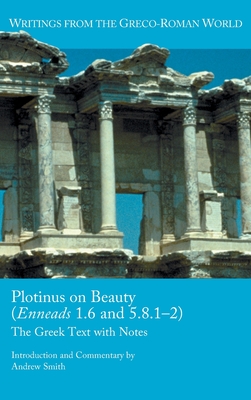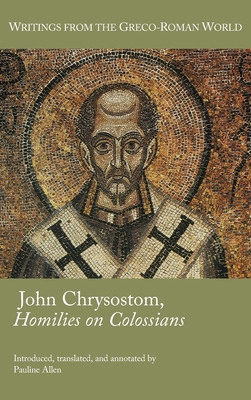


Books in series

The Chreia and Ancient Rhetoric
Classroom Exercises
2002

On the Mysteries of the Egyptians, Chaldeans and Assyrians
300

Theodore of Mopsuestia
Commentary on Psalms 1-81
2006

Philostratus's Heroikos
Religion and Cultural Identity in the Third Century C. E.
2004

Theodoret of Cyrus
Commentary on Daniel
2006

Pseudo-Gregory of Nyssa
Testimonies Against the Jews
2004

Diodore of Tarsus
Commentary on Psalms 1-51
2005

Progymnasmata
Greek Textbooks of Prose Composition and Rhetoric
2003

The Acts of Mār Mārī the Apostle
2005

Heraclitus
2003

Invention and Method
Two Rhetorical Treatises from the Hermogenic Corpus
2005

The "Belly-Myther" of Endor
Interpretations of 1 Kingdoms 28 in the Early Church
2007

The Rabbula Corpus
Comprising the Life of Rabbula, His Correspondence, a Homily Delivered in Constantinople, Canons, and Hymns
2017

The Letters
2009

4 Baruch
2005

Philostorgius
Church History
2007

John Rufus
The Lives of Peter the Iberian, Theodosius of Jerusalem, and the Monk Romanus
2008

Libanius's Progymnasmata
Model Exercises in Greek Prose Composition and Rhetoric
2008

Hierocles the Stoic
Elements of Ethics, Fragments, and Excerpts
2009

Philodemus, On Death
2009

The Letters of Symmachus
Book 1
2011

The Chreia and Ancient Rhetoric
Commentaries on Aphthonius's Progymnasmata
2012

Aristaenetus, Erotic Letters
2015

John Chrysostom, Homilies on Philippians
2013

Jewish Fictional Letters from Hellenistic Egypt
The Epistle of Aristeas and Related Literature
2018

The Ancient Martyrdom Accounts of Peter and Paul
2015

The Refutation of All Heresies
220

Ambrosiaster's Commentary on the Pauline Epistles
Romans
2017

L. Annaeus Cornutus
Greek Theology, Fragments, and Testimonia
2019

Documents from the Luciferians
In Defense of the Nicene Creed
2019

Plotinus on Beauty (Enneads 1.6 and 5.8.1-2)
The Greek Text with Notes
2019

John Chrysostom, Homilies on Colossians
2021
Authors

Librarian Note: There is more than one author in the GoodReads database with this name. See this thread for more information. Andrew^Smith others: Andrew2^Smith : Fiction, Young Adult Andrew3^Smith : GR Author Historical Fiction, Literature Andrew4^Smith : wrote Dr Who Andrew5^Smith : Scottish surgeon, explorer, ethnologist and zoologist (1797-1872) Andrew6^Smith : GR Author, Fiction & Nonfiction Andrew7^Smith : Literature & Fiction, Horror, Gothic Andrew8^Smith : Philosophy Andrew9^Smith : GR Author, Fiction Andrew10^Smith : GR Author, Fiction Andrew11^Smith : Children's book illustrator Andrew12^Smith: GR Author Andrew13^Smith: Sports Andrew14^Smith: IT Andrew15^Smith: South Africa, Zoology Andrew16^Smith: Veterinary, Canada Andrew17^Smith: Cities Andrew18^Smith: Business Andrew19^Smith: Comics Andrew20^Smith: Stroke Andrew21^Smith: GR Author, Children's books Andrew22^Smith: "Haunted historian" (NZ)

John Chrysostom (c. 347–407, Greek: Ἰωάννης ὁ Χρυσόστομος), Archbishop of Constantinople, was an important Early Church Father. He is known for his eloquence in preaching and public speaking, his denunciation of abuse of authority by both ecclesiastical and political leaders, the Divine Liturgy of St. John Chrysostom, and his ascetic sensibilities. After his death in 407 (or, according to some sources, during his life) he was given the Greek epithet chrysostomos, meaning "golden mouthed", in English and Anglicized to Chrysostom. The Orthodox and Eastern Catholic Churches honor him as a saint and count him among the Three Holy Hierarchs, together with Basil the Great and Gregory Nazianzus. He is recognized by the Eastern Orthodox Church and the Catholic Church as a saint and as a Doctor of the Church. Churches of the Western tradition, including the Roman Catholic Church, some Anglican provinces, and parts of the Lutheran Church, commemorate him on 13 September. Some Lutheran and many Anglican provinces commemorate him on the traditional Eastern feast day of 27 January. The Coptic Orthodox Church of Alexandria also recognizes John Chrysostom as a saint (with feast days on 16 Thout and 17 Hathor). John is known in Christianity chiefly as a preacher, theologian and liturgist. Among his homilies, eight directed against Judaizing Christians remain controversial for their impact on the development of Christian antisemitism.

Samuel Candler Dobbs Professor of the Classics at Emory University. His books include The Well-Read Muse: Present and Past in Callimachus and the Hellenistic Poets (Michigan Classics Press).
